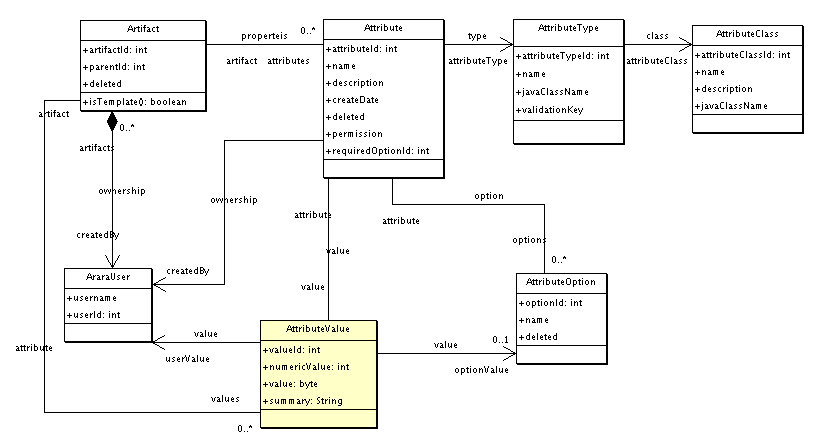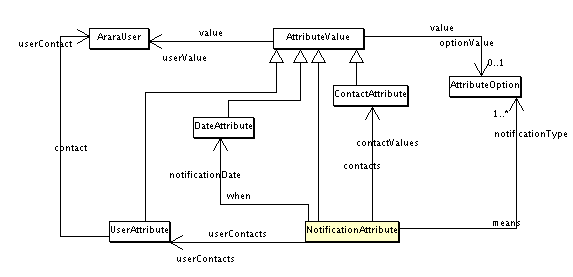The feature list provides only a
short description of every feature. Here we provie more details.
<<-- Short descriptions
This feature affects the functionality of the whole system.
It is considered to be the most important feature of the system.
To enable the abstractness we want, we need to keep artifacts
as simple as possible. At the same time, there must be a
simple way to create a more complex artifact.
The concept behind this is defined bellow. It does not
reflect the implementation. If you are not familiar with UML
you should jump directly to the Example.
|
Artifact concept UML Model
|

|
Bellow an explanation of the model.
|
Object
|
Field
|
Comment
|
Artifact
|
artifactId
|
Unique identifier
|
|
parentId
|
Defines wether this artifact is a template or not. If
parentId is NULL that means it is a template
and should be cloned, otherwise it points to the template
cloned to generate it.
|
|
deleted
|
A flag marking this artifact as deleted.
|
createdBy
|
The AraraUser who created the artifact.
|
values
|
The AttributeValue values of this artifact. This
can be any kind of information. If this is a template
artifact these are the default values used when cloning it.
|
|
attributes
|
These are the Attributes for the
Artifact. For templates this defines the
possible Attributes and for non-templates they are
cloned from the template's attributes.
|
Attribute
|
attributeId
|
Unique identifier
|
|
name
|
Name of the attribute (ie: Description, Status, Assigned
To, ...)
|
|
description
|
A description explaining what this attribute means
|
|
createDate
|
Date when this attribute was created
|
|
deleted
|
Flag marking this attribute as deleted or not
|
|
permission
|
Name of permission related to this attribute
|
requiredOptionId
|
A pointer to an option indicating that that is the
required option for this attribute.
|
|
artifact
|
The Artifact this Attribute belong to.
|
createdBy
|
The AraraUser who created the attribute.
|
value
|
Actual value of attribute.
|
options
|
If this attribute's values are among a set of possible
values, these values are defined by AttributeOption.
(ie: pending, sovled, ...)
|
attributeType
|
Defines the type of this attribute (ie: string, integer,
Drop down list, ...)
|
AttributeType
|
attributeTypeId
|
Unique identifier
|
|
name
|
Name of this type
|
|
javaClassName
|
Name of the class that handles this type
|
|
validationKey
|
Key for validation rule used for the value of an
attribute of this type
|
|
attributeClass
|
A more generic class that handles this attribute.
|
AttributeClass
|
attributeClassId
|
Unique identifier
|
|
name
|
The name
|
|
description
|
Description
|
|
javaClassName
|
Name of the class that handles this type
|
AraraUser
|
userId
|
Unique identifier
|
AttributeValue
|
valueId
|
Unique identifier
|
|
*
|
The other fields hold the possible values, depending
on the type
|
AttributeOption
|
optionId
|
Unique identifier
|
This concept allows us to create several template artifacts
that will be used as templates on the system. For instance,
we could define an artifact for the Todo
feature with the following attributes
- Owner - the user who owns it
- Expires - The date when this todo expires
- Status - Possible values for the status (not started |
started | follow up | finished). The requiredOption would
be finished.
- Involved - Users who are involved on this Todo
<<-- Short descriptions
Notification is a possible Attribute
for Artifacts. It contains
information about Contacts or
AraraUsers who will be notified. It should also
contain information about the type of Notification.
|
Concept UML for NotificationAttribute
|

|
This enable a pluggable architecture where we need to have a
"plug-in" for every notificationType.
<<-- Short descriptions
Datebook is a set of Artifacts derived of the
same template. The template will have all attributes needed
to enable a datebook feature. Some of them are:
- Owner - the user to whoom this Artifact belongs
- StartDate - A DateAttribute specifying when it
starts
- EndDate - A DateAttribute specifying when it ends
- UserInvolved - Serveral UserAttributes with the users
involved
- Notification - In case notification is required
One should note that other kinds of artifacts can be included
on a datebook, like for instance a Todo
Artifact could be displayed on the datebook on the day it expires.
<<-- Short descriptions
The addressbook is composed of several Contacts. These are
basically ContactAttributes or UserAttributes.
The contacts should not be restricted to having only one
contact. A group contact can be used to map a set of
Users and Contacts together as one only Contact.
<<-- Short descriptions
These are Artifacts very similar to Datebook ones. The
difference is that they have no StartDate, and they have
several options for status. And could have dependencies on
other Todo Artifacts.
<<-- Short descriptions
These are Artifacts that hold information about money.
- Owner
- Currency - US$, R$, EURO, ...
- Type - expense, income, ...
- UserInvolved - Serveral UserAttributes with the users
involved
- Notification - A notification about when a check is
cached for example
- Amount
<<-- Short descriptions
This is basically binary data, can also be an Attribute so
that it can be added to other Artifacts.
<<-- Short descriptions
Besides regular Preferences like
- Language
- User info - (email, name, ...)
- Preferred notification type
- ...
A set of Artifact templates (cloned from other templates) can
be created by the user. This way it is possible, for example,
for a user to define a template Datebook artifact. An example
would be CompanyMeeting, with attributes like Notification,
UserInvolved, ... pre-defined. This way every time a user
wants to set up a CompanyMeeting, he can clone this template
and fill in the gaps.
<<-- Short descriptions
Exporting and importing is made pluggable because most
information consists of Artifacts. Simply implementing an
Export/Import utility that transforms Artifacts into the
desired format and vise versa allows us to perform the task.
<<-- Short descriptions
Localization is acheived by using ResourceBundles for every language.
Pluggable emailing works because we can define an action to be
taken whenever an email is to be sent/read passing the basic
email information as parameters. All we need then is to
create a "plug-in" that knows how to call the desired emailing
application based on the available parameters.
